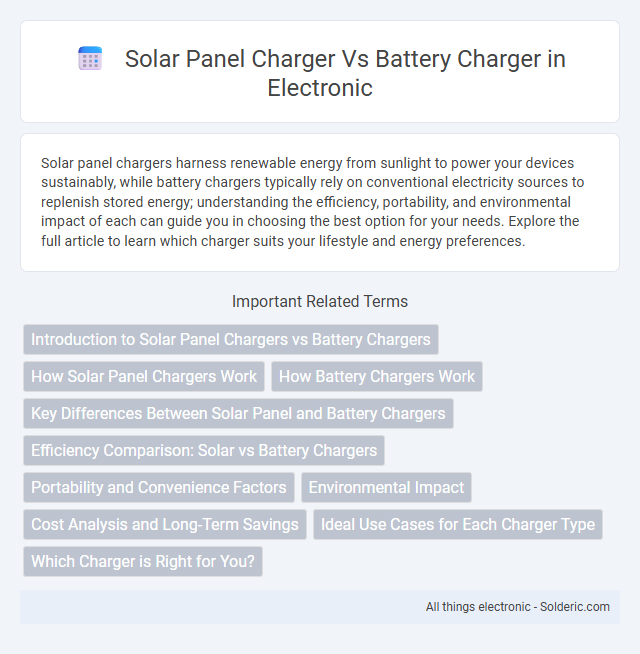Solar panel chargers harness renewable energy from sunlight to power your devices sustainably, while battery chargers typically rely on conventional electricity sources to replenish stored energy; understanding the efficiency, portability, and environmental impact of each can guide you in choosing the best option for your needs. Explore the full article to learn which charger suits your lifestyle and energy preferences.
Comparison Table
| Feature | Solar Panel Charger | Battery Charger |
|---|---|---|
| Power Source | Solar energy (sunlight) | Electric grid (AC power) |
| Charging Speed | Slower; depends on sunlight intensity | Faster; consistent power supply |
| Portability | High; often lightweight and compact | Varies; generally less portable |
| Usage Environment | Outdoor, remote areas without electricity | Indoor, locations with power outlets |
| Cost | Higher upfront cost; no ongoing energy cost | Lower initial cost; ongoing electricity cost |
| Environmental Impact | Eco-friendly; renewable energy source | Depends on electricity source; potential carbon emissions |
| Reliability | Weather dependent; less reliable in bad weather | Highly reliable with stable power supply |
| Maintenance | Low; clean panels occasionally | Low; depends on charger type |
Introduction to Solar Panel Chargers vs Battery Chargers
Solar panel chargers convert sunlight into electrical energy to power devices or charge batteries, offering a renewable and eco-friendly solution. Battery chargers use electrical outlets or other direct power sources to replenish battery energy more quickly and reliably. Comparing efficiency, portability, and environmental impact highlights the advantages of solar panel chargers for off-grid use and battery chargers for consistent, fast charging.
How Solar Panel Chargers Work
Solar panel chargers convert sunlight into electrical energy through photovoltaic cells, generating a direct current (DC) that powers your devices or charges batteries. Unlike traditional battery chargers that rely on an external power source, solar chargers store energy in a connected battery or directly supply power during daylight hours. Understanding this process helps you maximize the efficiency and sustainability of your charging options.
How Battery Chargers Work
Battery chargers convert electrical energy from a power source into stored energy within a battery by controlling voltage and current flow to ensure safe and efficient charging. They use regulated DC power, often incorporating multi-stage charging techniques like bulk, absorption, and float stages to extend battery life and optimize capacity. Smart battery chargers include microprocessor control to monitor battery voltage, temperature, and charge status to prevent overcharging or undercharging.
Key Differences Between Solar Panel and Battery Chargers
Solar panel chargers convert sunlight into electrical energy using photovoltaic cells, providing a renewable and eco-friendly power source ideal for outdoor or off-grid use. Battery chargers rely on an external power supply, such as AC mains or a vehicle battery, to restore energy to rechargeable batteries efficiently and quickly. Your choice depends on whether you prioritize sustainability and portability with solar chargers or speed and convenience with traditional battery chargers.
Efficiency Comparison: Solar vs Battery Chargers
Solar panel chargers convert sunlight directly into electricity, offering sustainable energy but with efficiency largely dependent on weather and sunlight intensity, typically ranging from 15% to 22%. Battery chargers rely on grid electricity, providing consistent and high-efficiency energy transfer often exceeding 90%, making them more reliable for quick and stable charging cycles. Your choice hinges on the balance between eco-friendly energy generation with variable efficiency and the steady, high-efficiency output of conventional battery chargers.
Portability and Convenience Factors
Solar panel chargers excel in portability due to their lightweight design and ability to harness sunlight anywhere, eliminating the need for electrical outlets. Battery chargers often require access to power sources and are bulkier, limiting convenience during travel or outdoor activities. The integration of foldable solar panels and compact battery chargers with USB ports enhances user flexibility, making solar panel chargers the preferred choice for on-the-go energy solutions.
Environmental Impact
Solar panel chargers harness renewable energy from the sun, significantly reducing carbon emissions and dependence on fossil fuels compared to traditional battery chargers. Battery chargers typically rely on electricity from the grid, which may come from non-renewable sources, contributing to higher environmental pollution. Choosing a solar panel charger helps your eco-friendly efforts by lowering your overall carbon footprint and promoting sustainable energy use.
Cost Analysis and Long-Term Savings
Solar panel chargers typically have higher upfront costs than traditional battery chargers due to the investment in photovoltaic technology and installation. Over time, solar chargers offer significant long-term savings by reducing or eliminating electricity bills and requiring minimal maintenance. Battery chargers rely on grid electricity, resulting in ongoing energy expenses that accumulate, while solar chargers harness renewable energy, enhancing cost-efficiency and environmental benefits.
Ideal Use Cases for Each Charger Type
Solar panel chargers excel in outdoor activities like camping and hiking where access to sunlight is abundant and electrical outlets are unavailable. Battery chargers are best suited for indoor use, powering devices quickly and efficiently through standard electrical sources. Your choice depends on whether portability and renewable energy or rapid charging and convenience are your priorities.
Which Charger is Right for You?
Choosing between a solar panel charger and a battery charger depends on your power needs and environment; solar panel chargers harness renewable energy, making them ideal for outdoor use or off-grid situations. Battery chargers deliver consistent and faster charging rates, perfect for indoor settings or when you need reliable, quick power restoration. Your decision should consider portability, charging speed, and access to sunlight to determine the right charger for your lifestyle.
solar panel charger vs battery charger Infographic

 solderic.com
solderic.com